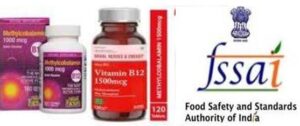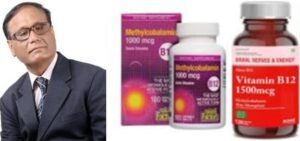Ban on Methylcobalamin to be revoked soon, echoes eminent consultant,Dr Sanjay Agrawal. Dr Sanjay Agrawal has stated that ‘the blanket ban on methylcobalamin would soon be revoked,as it has been approved as a nutraceutical ingredient by the scientific expert panel of the country’s apex food regulator’.


Methylcobalamin is an essential nutrient and is needed to treat vitaminB12 deficiency in people with pernicious anemia, diabetes and other disorders but the ban imposed on methylcobalamin warrants scrutiny in the wake of dual standards followed by the regulatory authorities. FSSAI has been drawing flak from the industry because of the ban on methylcobalamin which has rather become a contentious issue today. There is also a nationwide ban on methylcobalamin by state drug regulators citing that FSSAI has imposed the ban based on ICMR recommendation.
On behalf of the nutraceutical industry, Dr. Sanjay Agrawal has repeatedly urged the country’s apex food regulator and other Government authorities with numerous correspondences to revoke the ban on Methylcobalamin but till date they haven’t received a favorable reply from the concerned authority.
The recommended dietary allowance value and upper tolerance limit of Methylcobalamin fixed by the autonomous body (FSSAI) under the Ministry of Health & Family Welfare is unclear too, leading to total confusion in the nutraceutical industry. Once methylcobalamin is notified, the approved recommended dietary allowance value can be defined in a scientific way, based on evidence.
The industry has argued for clarity on the technical aspect under which, methylcobalamin,on one hand is approved as a drug with recommended dietary allowance value of 2000 mcg,whereas for nutraceuticals,it has been permitted with recommended dietary allowance value of 1 mcg only.DCGI recommends 2000 mcg of methylcobalamin even in injectable form and brands are also available as patients take methylcobalamin based on their medical condition.
Also the issue on missing exact information on tolerable upper limit of vitamin B12 or methylcobalamin for neurological disorders and in boosting immunity has been festering in the public domain.
Gujarat state based many nutraceutical manufacturers have alleged that the dual standards of FSSAI is very much evident with the presence of FSSAI approved brands of methylcobalamin in the market with 1500 microgram (mcg) quantity/per serving. Some of the widely sold brands are Rejunex CD3,Locopen capsule, Neugaba M 75 capsule, Nervup 500 mcg injection, Nuroz Forte, Nurofine 2500 injection, Actavis 2500 injection, etc. There are more than half a dozen of other brands with the same formula.
On January 7, 2020, FSSAI had issued a notification regarding recommended dietary allowance value of vitamin B12 which is specified as 1 mcg without mentioning type of vitamin B12 like methylcobalamin, adenosylcobalamin, hydroxycobalamin and cyanocobalamin. But the Drugs Controller General of India has recommended 2000 mcg of methylcobalamin in injectable form and respective brands are available as physicians are prescribing it for patients.
Previously, in a draft guideline issued in 2017, which is also considered as extension of regulation 2016, the FSSAI added the word ‘derivatives of vitamins’ to the approved list. Manufacturers continued to manufacture methylcobalamin considering it as a derivative of methylcobalamin.
The Section 22 of FSS Act, 2006 mentions foods for special dietary uses or functional foods or nutraceuticals or health supplements shall contain minerals or vitamins or proteins or metals or their compounds or amino acids in amounts not exceeding the recommended dietary allowances for Indians. As the regulations are bound to follow provisions mentioned under Act, the same has been enshrined into the Food Safety and Standards (Health Supplements, Nutraceuticals, Food for Special Dietary Use, Food for Special Medical Purpose, Functional Foods and Novel Foods) Regulations 2016.


But, in a letter to the FSSAI, CDSCO brought to the notice that various brands of products containing methylcobalamin are manufactured and sold having therapeutic intervention under the FSSAI license.The CDSCO had then urged the FSSAI to take action against Gujarat-based manufacturers for manufacture and sale of methylcobalamin meant for therapeutic intervention in contravention of norms.
Recently Dr Sanjay Agrawal has raised alarm on the blatant violation of administrative protocols in the regulatory regime in India citing the FSSAI’s directive to all State Drug Controllers to take action against manufacturers for production and sale of methylcobalamin meant for therapy in cases of diabetes and neurological disorders, in contravention to norms.
According to him, it is evident that the issue about taking action on methylcobalamin manufacturers is totally uncalled for and it indicates lobbying and malafide intent to discourage the industry to satisfy vested interests.
Thus, in a recent representation made to Union Ministry of Chemicals and Fertilizers, Dr Agrawal has recommended the Drugs Controller General of India (DCGI) to be given the sole authority for implementation of nutraceutical policies and regulations citing both FSSAI and ICMR as toothless authorities, giving reference that ten years back the nutraceutical industry was under the DCGI only and was well regulated.
He further mentions in the letter, ‘it is pertinent to mention here that there are only two variants of vitamin B12 namely cyanocobalamin and hydroxycobalamin which are covered under Food Safety and Standards (Health Supplements, Nutraceuticals, Food for Special Dietary use, Food for Special Medical Purpose, Functional Food And Novel Food Regulation 2016) (FSSAI-2016) but does not cover methylcobalamin’.
Few months ago, Dr Agrawal had also urged the Union Minister of Chemicals and Fertilizers to urgently notify methylcobalamin for neurological disorders and informed that regulatory action cannot be taken against those who are manufacturing methylcobalamin-based formulations without scientifically defining the efficacious recommended dietary allowance value.
According to nutraceutical industry experts, no adverse effect has been associated with excess methylcobalamin intake from food or supplements in healthy individuals. Methylcobalamin has a history of safe long term use as a therapeutic agent given in high dosage or via intramuscular injection for the treatment of disorders associated with impaired vitamin B12 absorption but industry is yet to see the much awaited notification on the same.
Dr Agrawal has been pursuing the issue of revoking the ban on methylcobalamin by FSSAI for more than a year but yet this issue has not come to a logical conclusion. On the contrary, FSSAI has allowed usage of cyanocobalamin- which has cyanide content within, but banned methylcobalamin- which is a superior form of vitamin B12.
Dr Agrawal has again sought clarity from FSSAI on Indian Council of Medical Research stipulated values of recommended dietary allowance value for methylcobalamin as prophylactic use in neurological disorders. Dr Agrawal’s recent correspondences to FSSAI in spite of being addressed in a holistic manner have turned into a blame game between FSSAI and ICMR.
According to sources, taking an entirely U-turn, the national food safety regulator has instead directed the industry to refer the issue to the ICMR in blatant denial of laid down protocols and ethics. This is leading to confusion and hence detrimental to the public interest.
Industry, after almost more than a year, is still perplexed with FSSAI clarification regarding recommended dietary allowance values on methylcobalamin (vitamin B12). Any food business operator who wants to manufacture, import, market or sell the afore mentioned products shall have to comply with the provisions of these regulations.
Dr Agrawal had received a letter in December 2019 from FSSAI about Methylcobalamin being soon to be approved and to be provided recommended dietary allowance value of it for neurological disorders, but industry is yet to see the much awaited notification on the same.
Even as the notification regarding approval of the right recommended dietary allowance value for methylcobalamin remains pending for almost more than a year despite FSSAI scientific panel’s nod of notifying it in last December, the drug and nutraceutical industry rues that the nationwide ban on methylcobalamin has proved to be an extortion bid by state drug controllers in the guise of regulations.
This is all the more contradictory considering that ICMR and National Institute of Nutrition have recently issued another report which have different stipulated recommended dietary allowance values of methylcobalamin and estimated average nutrient requirements for Indians. In the Norwegian Vitamin (NORVIT) intervention trial also, patients with acute myocardial infarction received 400 mcg of vitamin B12 daily for three years and reported no serious adverse events.
On behalf of the nutraceutical industry, Dr Agrawal is planning to again make a representation on this matter with the Union Ministry of Chemicals and Fertilizers since their previous correspondences (December 2019 and June 2020) and pleas to FSSAI have not been addressed with due diligence and rationality.











